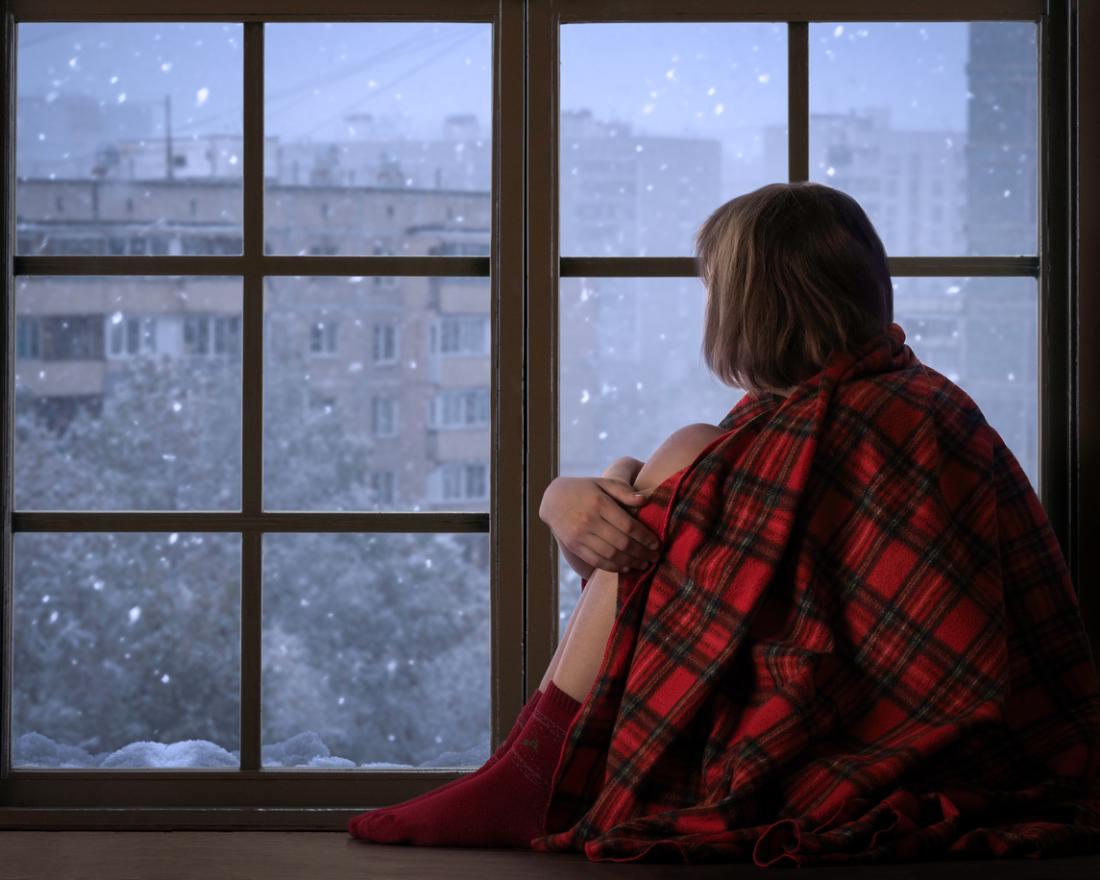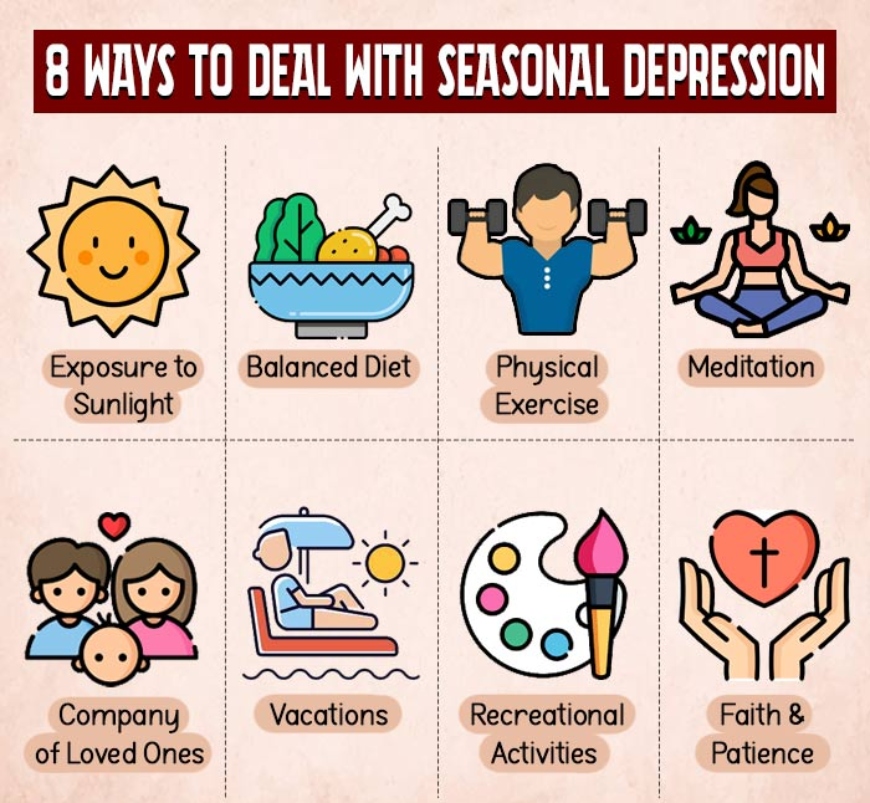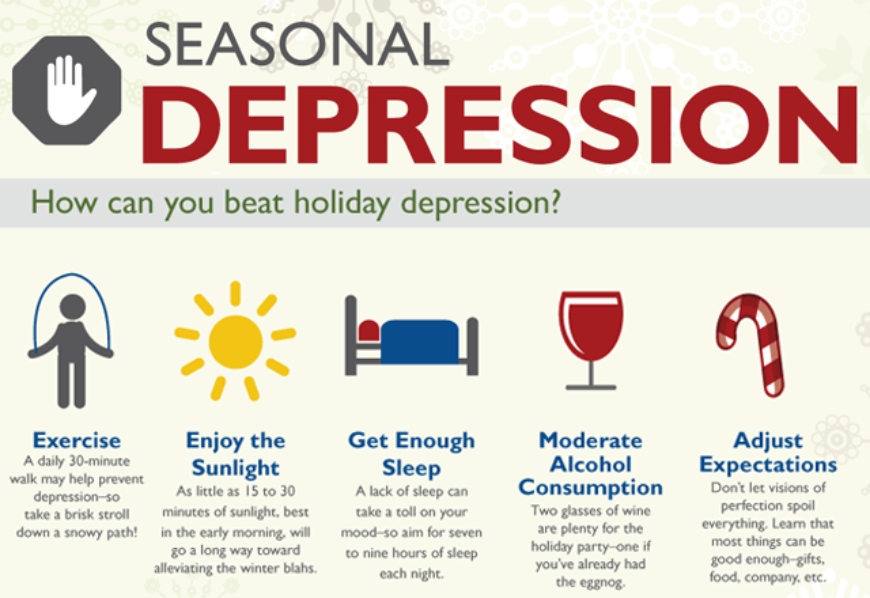Coping With Seasonal Depression - 9 Methods That Work
Learn about coping with seasonal depression. Discover strategies for managing symptoms and finding relief.
Author:Karan EmeryReviewer:James PierceMar 05, 2024501 Shares14.3K Views

Seasonal depression, also known as seasonal affective disorder (SAD), is a type of depression that occurs at the same time each year. It typically happens during the fall and winter months when daylight hours are shorter. Coping with seasonal depressioncan be challenging, but there are various strategies and techniques that can help alleviate symptoms and improve overall well-being.
In this guide, we'll explore the causes, symptoms, and effective coping with seasonal depression.
Understanding Seasonal Depression
Seasonal depression is believed to be caused by a combination of factors, including changes in sunlight exposure, disruptions in circadian rhythms, and alterations in neurotransmitter levels, such as serotonin and melatonin. Reduced sunlight during the fall and winter months can disrupt the body's internal clock and lead to a shift in mood-regulating chemicals in the brain.
Symptoms of seasonal depression are similar to those of major depressive disorder and may include:
- Persistent feelings of sadness or hopelessness
- Loss of interest in activities once enjoyed
- Changes in appetite or weight
- Difficulty sleeping or oversleeping
- Fatigue or low energy
- Difficulty concentrating or making decisions
- Irritability or agitation
- Withdrawal from social activities
- Thoughts of death or suicide
Important Details Regarding SAD
- Seasonal Affected Disorder (SAD) is a form of depression that often strikes in the fall and winter.
- The reason of SAD is unclear. Seasonal affective disorder (SAD) may have some genetic component, as reduced sunlight and shorter days are believed to be linked to a chemical shift in the brain. Another hormone connected to sleep, melatonin, may possibly be connected to SAD.
- In general, almost everyone who suffers from depression has persistent melancholy and may become agitated, helpless, and hopeless.
- A psychiatrist or other mental health specialist may diagnose SAD following a thorough mental health examination and review of the patient's medical history.
- The most common treatments for depression include light therapy, counseling, and occasionally medications.
Here are 9tips forcoping with seasonal depression:
While seasonal depression can be challenging, there are several coping strategies that can help manage symptoms and improve overall well-being:
Light Therapy
Light therapy, also known as phototherapy, involves exposing oneself to bright, artificial light to mimic natural sunlight. This can help regulate circadian rhythms, increase serotonin levels, and alleviate symptoms of seasonal depression. Light therapy devices are available for home use and typically involve sitting in front of a light box for a specified amount of time each day, usually in the morning.
Psychotherapy
Talk therapy, or psychotherapy, is an additional treatment option. You can benefit from cognitive behavioral therapy, a subtype of psychotherapy:
- Discover good coping mechanisms, particularly for minimizing avoidance behavior and planning purposeful activities.
- Recognize and alter any negative beliefs or actions that can be aggravating your symptoms.
- Acquire stress management skills.
- Include good habits like getting more exercise and maintaining better sleep habits.
Get Outside
Spending time outdoors, even on cloudy days, can help increase exposure to natural light and improve mood. Take short walks during daylight hours, open curtains and blinds to let in natural light, and position yourself near windows whenever possible. Exposure to natural light can help regulate circadian rhythms and boost serotonin levels, which can help alleviate symptoms of seasonal depression.
Regular Exercise
Regular physical activity has been shown to have mood-boosting effects and can help alleviate symptoms of depression, including seasonal depression. Aim for at least 30 minutes of moderate exercise most days of the week, such as walking, jogging, cycling, or swimming. Exercise releases endorphins, which are natural mood lifters, and can help reduce feelings of stress and anxiety associated with seasonal depression.
Maintain A Healthy Routine
Maintaining a regular routine can help regulate sleep patterns and improve overall well-being. Aim for consistent bedtimes and wake-up times, even on weekends, and prioritize healthy habits such as eating nutritious meals, staying hydrated, and managing stress. Establishing a routine can provide a sense of stability and control, which can be particularly helpful when coping with seasonal depression.
Medications
Antidepressant therapy may be beneficial for some patients, particularly if their symptoms are severe. For those with a history of depression, an extended-release form of the antidepressant bupropion (Wellbutrin XL, Aplenzin) may help prevent depressive episodes. Other antidepressants may also be prescribed often for treatment.
Antidepressant therapy may be suggested by your healthcare professional prior to the yearly onset of symptoms. In addition, he or she could advise you to keep taking the antidepressant after your symptoms have generally subsided.
Remember that the full effects of an antidepressant may not be felt for a few weeks. Additionally, it could take some trial and error to discover a drug that both works well for you and has the fewest adverse effects.
Social Support
Seeking support from friends, family, or a support group can be beneficial when coping with seasonal depression. Talking about your feelings with trusted individuals can provide validation, encouragement, and perspective, and help reduce feelings of isolation and loneliness. Consider joining a support group for individuals with seasonal depression or connecting with others online who are experiencing similar challenges.
Practice Self-Care
Self-care activities such as relaxation techniques, mindfulness meditation, and engaging in hobbies or activities that bring joy and fulfillment can help alleviate symptoms of seasonal depression. Take time for yourself each day to engage in activities that nourish your mind, body, and spirit, whether it's reading a book, taking a bath, or practicing yoga. Prioritizing self-care can help reduce stress, improve mood, and increase overall well-being.
Seek Professional Help
If symptoms of seasonal depression persist or interfere with daily functioning, it's important to seek professional help from a mental health professional. A therapist or counselor can provide support, guidance, and evidence-based treatments such as cognitive-behavioral therapy (CBT) or medication management. In some cases, a combination of therapy and medication may be recommended to effectively manage symptoms of seasonal depression.
Coping With Seasonal Depression - FAQs
How Is Seasonal Depression Different From Regular Depression?
Seasonal depression shares many symptoms with regular depression, but it occurs at specific times of the year and is often triggered by changes in daylight. Symptoms typically improve in the spring and summer months.
What Are Some Coping Strategies For Seasonal Depression?
Coping strategies for seasonal depression may include light therapy, regular exercise, spending time outdoors, maintaining a healthy diet, practicing relaxation techniques, and seeking support from friends, family, or a mental health professional.
When Does Seasonal Depression Hit The Hardest?
In the US, January and February are typically the hardest months for those suffering with SAD. Though far less prevalent, summer SAD affects a small number of people. There is more to SAD than the "winter blues." The symptoms might make it difficult to go about regular tasks and can be extremely upsetting and overwhelming.
Is Seasonal Depression A Disability?
One kind of depressed illness is seasonal affective disorder, or SAD. People who experience depressive symptoms that interfere with many parts of their lives may qualify for either short-term or long-term disability payments.
Is Seasonal Anxiety A Thing?
Yes, when a person's mental health is impacted by a change in the weather, they experience seasonal anxiety. Many people experience an increase in anxiety symptoms during the winter months because of the lower temperatures and less sunlight.
Can Light Therapy Help With Seasonal Depression?
Yes, light therapy, also known as phototherapy, involves exposure to artificial light sources that mimic natural sunlight. It can help regulate the body's internal clock and improve mood and energy levels in people with seasonal depression.
When Should I Seek Professional Help For Seasonal Depression?
If you're experiencing symptoms of seasonal depression that interfere with your daily functioning or quality of life, or if you're having thoughts of self-harm or suicide, it's important to seek help from a mental health professional. They can provide evaluation, support, and appropriate treatment options tailored to your needs.
Conclusion
Coping with seasonal depression can be challenging, but there are several strategies and techniques that can help alleviate symptoms and improve overall well-being. By incorporating light therapy, getting outside, regular exercise, maintaining a healthy routine, seeking social support, practicing self-care, and seeking professional help when needed, individuals can effectively manage seasonal depression and experience a greater sense of well-being during the fall and winter months.

Karan Emery
Author

James Pierce
Reviewer
Latest Articles
Popular Articles

